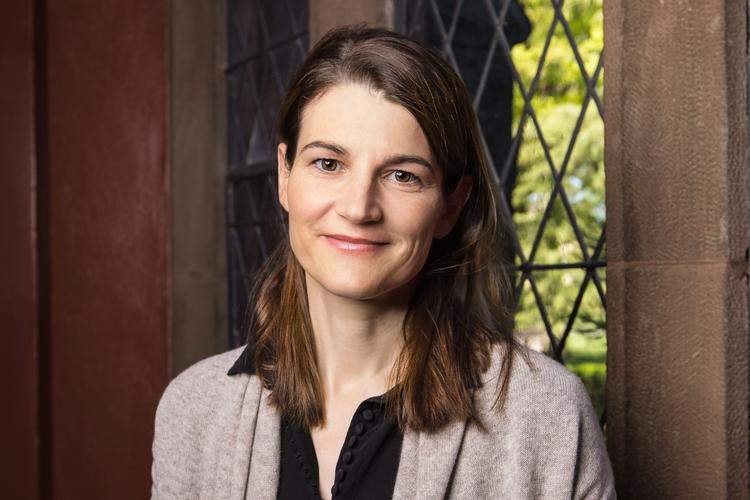This Q&A series highlights the work of the Humanities Council’s current Old Dominion Research Professors. The professorship provides additional research time for Princeton faculty members and seeks to enhance the University humanities community more broadly.
This year, as a 2024-25 Old Dominion Research Professor in the Humanities Council, Daniela Mairhofer (Classics) is working on a book project titled “Totum Nihil: Political and Social Critique in the 13th Century.” The book revolves around a 13th-century Latin poem that has been largely ignored by scholarship.
Tell us why you chose your current research topic.
My research this year focuses mainly on a book entitled “Totum Nihil: Political and Social Critique in the 13th Century,” which is under contract with Oxford University Press and introduces a new medieval Latin text. My decision to make this text available to both a specialist and a broader readership is based on the fact that it represents the fascinating voice of an anonymous author who, in a strikingly original way, laments that the circumstances of his time are all wrong. I was drawn to the project not only by the text’s uniqueness and complexity but also by its potential to offer new insights – particularly to literary practice and artistic creation. It raises interesting questions and, importantly, opens new pathways for exploration across a range of disciplines.
What do you hope that this research will add to your field?
I hope that my research on this newcomer will not only broaden our understanding of medieval (Latin) literature, but also make a meaningful contribution to a range of disciplines, including intellectual history, philosophy, science, theology and history. In uncovering this new source, my aim is to contribute not only to the textual tradition itself, but also to deepen a broader conversation about political and social criticism and its methodologies in the Middle Ages.
What’s one thing about your current project that you think would interest the public?
It’s a text about nothing written by no one.
Tell us about your year as an Old Dominion Research Professor.
This ‘in-residence’ research leave has been different from previous leaves in that it fostered an intense interdisciplinary dialogue. Through more intense intellectual exchange with colleagues from various fields in the humanities and social sciences, not only in the context of specific events but also spontaneously on campus, I have gained new perspectives that have directly enriched my research questions and methods. The stabilitas loci, and therefore the slower pace of this residency, has allowed me to reflect more deeply, to dig deeper into the material in a familiar environment with all the resources at hand, both in the office and in the Firestone Library, without the challenges of finding my way around a new place to do research, for example. This has made my writing process more creative. The danger of monotony was averted by several events on campus, but also by lecture trips – many in my case – which provided variety and at the same time guaranteed the joy of being able to return to work in a quiet and familiar environment. An unexpected aspect of this year’s experience has been how stimulating it can be to discuss people’s research that seems furthest removed from one’s own scholarly interests.
Are there any memorable humanities events that you’ve attended this year?
I attended several Council events this year, including conferences and lectures. I also really enjoyed the weekly Society of Fellows’ lunchtime seminars: the high academic level, the collegial and humorous atmosphere and, of course, the food. Each seminar paper opened a window into a different world of inquiry – ranging from archival discoveries to bold theoretical concepts – that consistently challenged and expanded my own assumptions. The diversity of approaches, topics and fields of study not only deepened my appreciation for the breadth of the humanities at Princeton and confirmed the essential role of the humanities within an academic institution, but also sparked unexpected connections to my own research. The Q&A following each presentation created a lively and generous space for exchange, where ideas could be tested, stretched, and reimagined.
Is there any other piece of your work that you’d like to highlight?
My additional research time as Old Dominion Professor has allowed me to devote myself fully to ‘Nothing’, but also to focus on a small number of side projects, mainly centered on Latin palimpsests and Latin literature, of all periods. With regard to palimpsests, I’m preparing a book with two linguist colleagues that will be an important contribution to the reappraisal of the earliest written tradition of the German language, as it promises to answer some of the unresolved questions about the ‘Abrogans’ (the oldest known German-Latin glossary), such as the origin of the archetype. By focusing on a significant yet previously overlooked witness that survives in the form of a palimpsest only, the project will complete the history of the transmission of one of the most famous glossaries, providing valuable insight into the interaction between Latin and the vernacular. I’m also currently completing an article analyzing the Latin palimpsests from St Catherine’s on Mount Sinai, Egypt. Based on paleographical, codicological and textual analyses, I show how the decontextualization of texts and codicological units has led to a misunderstanding of the origin, function, use and reuse of these fragments. In addition, I have written articles on a small number of Latin authors: Boethius, Notker Labeo, Statius and Petrarch.
















